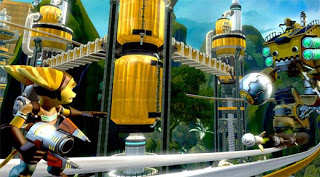This post has not been edited by the GamesBeat staff. Opinions by GamesBeat community writers do not necessarily reflect those of the staff.
 Is Ratchet and Clank a platformer or a third-person shooter? Is Prince of Persia an action title or a platformer? Is Mass Effect a shooter or a role-playing game?
Is Ratchet and Clank a platformer or a third-person shooter? Is Prince of Persia an action title or a platformer? Is Mass Effect a shooter or a role-playing game?
The above three examples may all have obvious answers, but I can't deny that their appeal is equally split across the two genres. Although many love the role-playing aspects of the first Mass Effect, it's clear that enough interest in the game's more action-oriented segments warranted their less prominent role in the second installment. You may have approached Ratchet and Clank for some light-hearted platforming, but the weapons you can command may have attracted others.
Splitting a game across genres may seem like a cash-in of sorts. Rather than putting all your eggs in one basket by trying to appeal to just stealth-action game fans with your tale of subterfuge and political intrigue, why not work in some strategy elements to try and cash in on that X-Com loving crowd? Genre splitting, if done well, will broaden appeal and bring in an audience that otherwise wouldn't have touched the game — maybe even introduce a new genre to them in the process.
It wasn't always like this. Super Mario Bros. never let you hop into a warthog for a brief vehicular segment, nor did Bill and Lance find their skills magically "level up" at the end of each stage of Contra.

Over time, though, things changed. Our platforming heroes soon found themselves unable to simply squash enemies, but instead needed swords, guns, and an ever increasing array of special moves to turn their foes into dust. Soldiers suddenly discovered the lairs of their nemesis' to be filled with gaps and lava pits that previously only Mario had to brave. Nowadays, you can't think about releasing an online shooter without some sort of progression after each match.
No one ever sat down to try and make this happen. Like most things, it just naturally evolved out of a desire to please more people more of the time. Cherry picking your features from a plethora of different genres allows for a much broader experience, whilst filtering out the genre staples some might dislike.
So long as you don't half-ass the inclusion of these features, you needn't worry that they'll harm the overall experience.
Let's put on our tin-foil hats for a moment and consider this: Has the industry's desire to do everything held back developers from their true potential?
 Imagine for a moment that the first three Super Mario Bros. games never existed. Super Mario World never became the best launch game ever. And Super Mario 64? Don't get me started. With the entire Mario legacy erased, would Nintendo have instantly green lit Super Mario Galaxy?
Imagine for a moment that the first three Super Mario Bros. games never existed. Super Mario World never became the best launch game ever. And Super Mario 64? Don't get me started. With the entire Mario legacy erased, would Nintendo have instantly green lit Super Mario Galaxy?
The obvious answer is yes. Many believe the series to be the definitive platformer of this generation, but if we look at Mario from a revenue-conscious publisher's perspective, does it really seem as easy a sell?
For one, it's cute — almost too cute. That rules out the teenage crowd. Mario has no deep, involving storyline either, which limits the potential for sequels. How does this guy fight? He jumps on mushrooms?! Get real!
 I'm exaggerating to prove a point, but I think there's something to this. Super Mario Galaxy is a phenomenal game because it takes one genre and pushes it as far as it will possibly go. It doesn't even glance at what the competition is doing, because it's so focussed on getting the maximum about of depth out of Mario's ability to run and jump. The result is awe inspiring; a game which doesn't just leave its contemporaries in the dust, but makes us wonder what they'd been doing for ten years.
I'm exaggerating to prove a point, but I think there's something to this. Super Mario Galaxy is a phenomenal game because it takes one genre and pushes it as far as it will possibly go. It doesn't even glance at what the competition is doing, because it's so focussed on getting the maximum about of depth out of Mario's ability to run and jump. The result is awe inspiring; a game which doesn't just leave its contemporaries in the dust, but makes us wonder what they'd been doing for ten years.
Genre splitting is a wonderful thing. It broadens a potential audience, deepens games, and nine times out of ten makes them better as a result. But specialization has value, and it's one we shouldn't forget any time soon.
